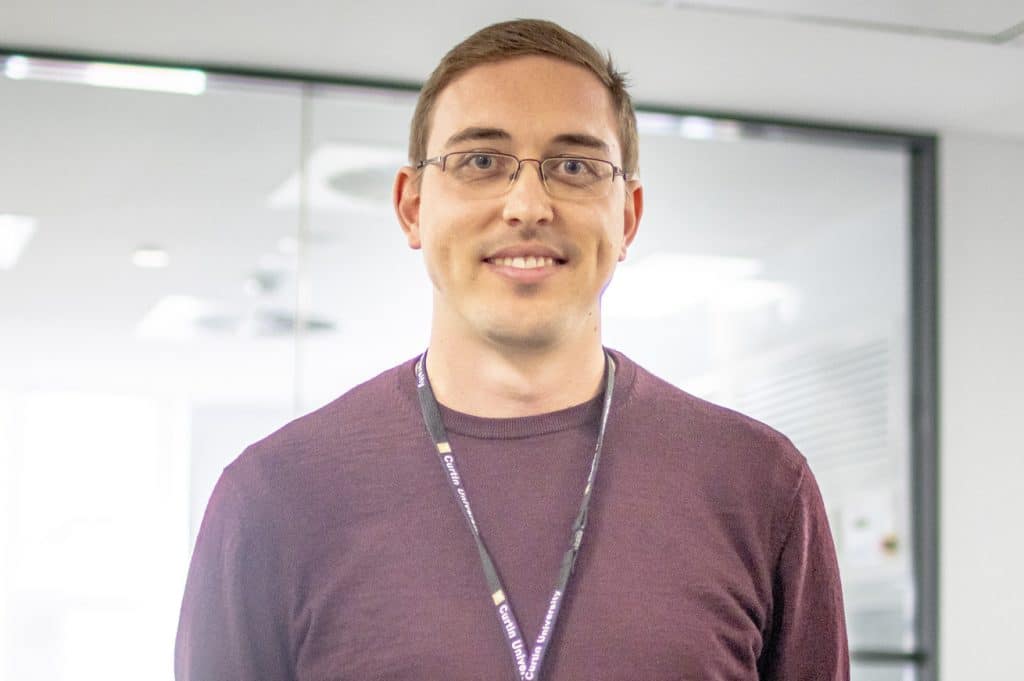
23 August 2022
There’s little doubt we would advocate embedding Scripture into church, but what about embedding science? In this article, Dr Jacob Martin from Curtin University, Western Australia, speaks to ISCAST Publications Director Dr David Hooker. Jacob has just been selected by the ABC for the “Top 5 Media Residency Program”. He shares his thoughts on his faith, his work, and what science can offer the church.
David: Tell us a bit about yourself Jacob.
Jake: I finished my PhD some years ago. I’m now in my thirties researching materials at Curtin University, having come from New Zealand.
David: What originally grabbed your attention about the materials science field?
Jake: I actually got interested in materials science because of carbon capture. Carbon materials are critical for renewable energy. They’re used in lithium-ion batteries, water filtration, hydrogen storage, super capacitors, and carbon nanotubes for carrying electricity.
David: What’s been the biggest science challenge so far?
Jake: Generally, science is challenging because we’re in unchartered territory most of the time. But probably the biggest challenge for me is the internal conflict within science communities, with difficulty getting new ideas to be appreciated. So, there’s a challenge to maintain those relationships in a way that is honouring to God.
Read more: Why trusting God first is vital for biologist Caleb Dawson
David: Sure, scientists are passionate – and often competitive! Let’s move on to talk about the faith side of things. How did you become a Christian?
Jake: My parents came back to faith when they had us kids. Seeing them coming back and then changing had a really big impact on me. Then, in our church we had a lot of really stimulating people from universities – with lots of differing opinions! This was helpful because it started me wrestling with what it means to be scientist-believer. As a young believer I needed to reconstruct the way in which modern science can work cohesively with my faith.
David: Living out our faith in the workplace can be quite challenging. How have you tackled this?
Jake: The first point I would make is that being a scientist is a vocational calling. I have the capabilities and the interest that God has given me, so I have a responsibility to work in that space. It’s very important, I believe, to have Christians in every vocation. I was reading 1 Thessalonians last night, thinking through what it means for a believer to live a quiet life, living as Christ’s representatives on this earth, and making sure our interactions with people are positive and authentic.
I’ve enjoyed talking with students at church who struggle with how their faith connects with science. Many students have a very negative view of science, partly because science has set itself up as anti-religious. I’ve really appreciated helping them broaden their view of God and of science, where science and faith work cohesively together.
Read more: Can a psychological theory help us understand how we relate to God?
David: As well as materials science, you have a strong interest in biology. Any thoughts on the resolution you’ve come to between evolution and your Christian faith?
Jake: This was a long and interesting journey for me. In my upbringing evolution wasn’t really discussed; it was pushed aside, or I might get directed towards some dodgy websites.
But, when I came to university, I started to wrestle with it. I saw that my lecturers in biology were tired of having arguments with fundamentalist Christians about evolution, like “If you bring this up, I will be incredibly annoyed”. But at church I said to an older guy, “I’m struggling with faith and science,” and he said, “Oh! You’ve just got to learn about evolution because it’s the most beautiful thing in the world … and God is so amazing”. My reaction was, “What are you talking about?” He said, “You need to talk to Dr Graeme Finlay”. He had written a textbook on human evolution that’s published by Oxford University Press.
Graeme explained how we can see where and when genes were inserted and how they were changed through evolution to make new creaturely functions. We can see the way in which God, over geological time, instilled within the creative order the potentiality to create everything. God in his goodness has enabled it, and he upholds it and maintains it.
But none of that changes the historicity of Jesus of Nazareth, his gospel, and his call on our lives.
Dr Finlay and a New Zealand theologian, Dr Nicola Hoggard Creegan, and I started to think about how we could interact with the churches. With this goal, we founded New Zealand Christians in Science (NZCIS), an ISCAST equivalent in New Zealand.
David: You’re also passionate about climate change and planetary health, but it wasn’t always the case. Could you share a bit about that part of your journey?
Jake: Dr Finlay’s course on climate change helped me to understand the way the stability of the climate enables the peace we’ve enjoyed over 10,000 years and the development of civilisation. When that peace is disrupted, it leads to a lot of suffering. As Christians we’re to pray for the shalom of the land. I’m learning about what it looks like for a Christian to care about the environment. Christians, by not engaging with some of the science, haven’t necessarily dealt with the sins of overconsumption and of pollution that destabilise the peace that we pray for, so that’s a problem.
And I think there’s also this unfortunate view of some in the churches: that the material world will be gone and then we will have a new world; so, you should throw this material world on the trash heap. It’s an unfortunate dualism where the spiritual is better than the material. Yet, Jesus is the material manifestation of God. So, that’s a key issue we should be concerned about.
David: Wonderful insights, Jake. We’re moving towards the last couple of questions, now. Where would you like to go in your faith-science journey?
Jake: I love communicating science and have recently been selected in the ABC’s Top Five Science Ambassadors. I’d like to see churches engage with the problems and solutions that science reveals. I’d also like to see science engage more with religious communities. There’s been a breakdown, I think, in relationship in both directions, and I’m hoping that organisations like ISCAST and NZCIS will be able to facilitate better dialogue between those two communities.
Read more: Technology can now ‘enhance’ humanity: Should Christians be on board?
David: In closing, let’s think of our Christian readers and listeners, some of whom may aspire to be scientists. What encouragement would you like to give them?
Jake: Science is for Christians and the non-religious. But, as a Christian who is a scientist, there’s a depth which I really appreciate. I enjoy it so much because when I do discover things about the material world, I can direct that towards worship. But, secondly, I can direct those findings towards peace on earth. So there’s this dual call of science: to bring glory to God and for peace on earth. If God is calling you to science and you have the capabilities, then do science faithfully, and give God glory.
David: It’s a fascinating integration you’ve made there, Jake: dovetailing science, which some associate with hardcore facts and complete rationality, with the theme of peace on earth. Thank you, Jake; we’ll finish up there.
Jake: Thank you so much, Dave.
For more faith news, follow The Melbourne Anglican on Facebook, Twitter, or subscribe to our weekly emails.







